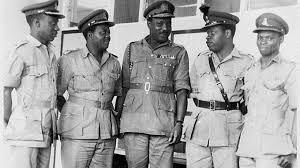
Between 1946 and 1966, Nigeria operated a federal system of government, but the military coup on January 15, 1966, led by five majors, marked a significant turning point. The coup paved the way for Major-General Thomas Aguiyi-Ironsi to become the military Head of State and Commander-in-Chief, who subsequently introduced a unitary system. This shift from federalism to unitarism has had lasting impacts on Nigeria’s political structure.


Key Consequences of the Unitary System:
- Centralization of Power: The unitary system concentrated power in the central government, undermining the autonomy of regional governments.
- Weakening of Regional Authorities: The abolition of regional authorities led to a lack of representation and participation in governance at the local level.
- Ethnic Tensions: The unitary system exacerbated ethnic tensions, as different groups felt marginalized and excluded from decision-making processes
Legacy of Ironsi’s Rule:
- Brief but Impactful Tenure: Ironsi’s rule lasted barely six months, but his introduction of a unitary system had far-reaching consequences for Nigeria’s political development.
- Contribution to Civil War: The unitary system contributed to the outbreak of the Nigerian Civil War (1967-1970), as Biafra seceded from Nigeria in response to perceived marginalization.
Current Implications:
- Restructuring Debates: The legacy of Ironsi’s unitary system continues to influence debates about restructuring Nigeria’s federal system, with many advocating for greater autonomy for regional governments.
- Ongoing Challenges: Nigeria still grapples with issues of resource control, revenue allocation, and local government autonomy, highlighting the need for a more equitable federal system




